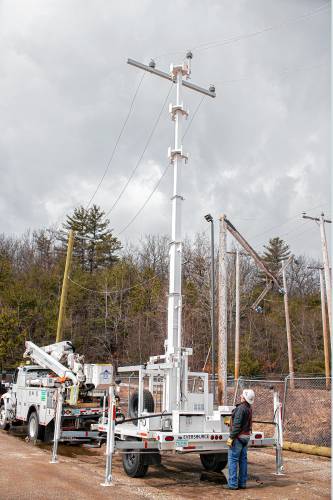NOTE: You can see lots of Geoff Forester’s photos at the Monitor version of this article (here).
Many good ideas seem obvious once somebody has thought of them. RapidPole is a good example.
“It’s kind of surprising that something like this hasn’t been done already,” said Timothy McHugh, manager for an Eversource program called NH Troubleshooters, as he showed off the team’s creation recently at the Hooksett operations center.
RapidPole is, as the name implies, a big pole that can be rapidly deployed, rising as far as 25 feet above a trailer using battery-powered pneumatics. It is being used by Eversource, most recently in Laconia, to hold up electric wires while crews replace a utility pole that has been snapped in a car accident or pulled down by falling trees on the lines.
That allows power to get returned quickly to the neighborhood instead of waiting for a new utility pole to get hauled in from the storage yard, holes to get dug, wires moved and transformers replaced. Speed is the point.
“Pole sets can take between three and eight hours,” said McHugh. That’s a long time for people to be in the dark, freezing without heat in winter or roasting without air conditioning in July. “This is basically a temporary pole. We can have our troubleshooters, acting as first responders, deploy it in under 20 minutes. They get the wire up, can energize much more quickly.”
McHugh, who has been in the business for 34 years starting as a lineman for Boston Edison, said the spur for the project was a 2020 accident in Milford that took out two poles near a substation during that summer’s terrible heatwave. The replacement proved difficult for a variety of reasons and the neighborhood sweltered for many hours, leading him to wonder whether there wasn’t some way to shorten customers’ wait.
That fit into his role at Eversource, leading the Troubleshooting team. This is a group – 43 at the moment – designed to be available 24/7 to respond to power-out emergencies of many kinds. As climate change makes extreme weather both more common and more extreme, utilities will be responding to more emergencies, which raises the value of options that are quick to deploy.
“We reached out to a defense contractor who builds telescopic masts and talked about using his product for the utility industry,” McHugh said.
The result is two prototypes. One is a telescoping pole on a single-axis tactical trailer with high clearance for maneuvering over rough ground, which can be pulled by one of Eversource’s big bucket trucks to the problem site. With a series of cross-arms that can be attached to the pole in any direction, it can be quickly raised to hold up fallen wires in many configurations by just a couple of people.
The other unit is a multi-axle backfeed trailer, designed not just to hold up wires so they can carry power but to insert power into the system as needed. It holds a Rapid Pole and a 2500 kva transformer. When connected to a generator, it’s basically a temporary power station.
“We can basically put a generation station anywhere,” said Brad Soucie, a lineman and troubleshooter who demonstrated RapidPole last week. “Say a flood takes out poles and isolates a substation. We have the ability to set this up on the other side of the flood and it’s no longer isolated. Or consider a tornado – any emergency situation. This is fast.”
It’s also less wasteful than building a temporary power station. “It’s a shame to build a whole bunch of stuff just to tear it down,” said Soucie.
McHugh said that “probably five or six times in the past three years” crews have had to respond to such a situation, installing a temporary pole, bringing in a generator and transformer to backfeed the power. “The average time is between 3 ½ and 4 hours. … When we demonstrated this in Sullivan, we had it ready in 20 minutes.”
RapidPole has been demonstrated to crews throughout Eversource’s territory in New Hampshire and in Massachusetts and Connecticut, the other New England states where it is a regulated power utility. McHugh said he expects the company to order more of them and other utilities to follow suit.
They’ve already made some changes based on suggestions from linemen and may well be making more.
“This is in its infancy,” McHugh said.


 Return to the Concord Monitor
Return to the Concord Monitor